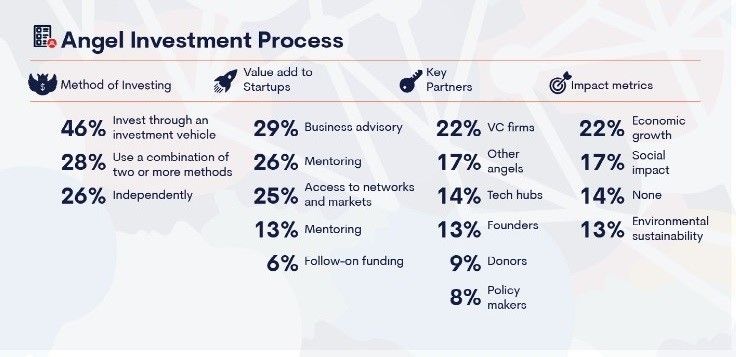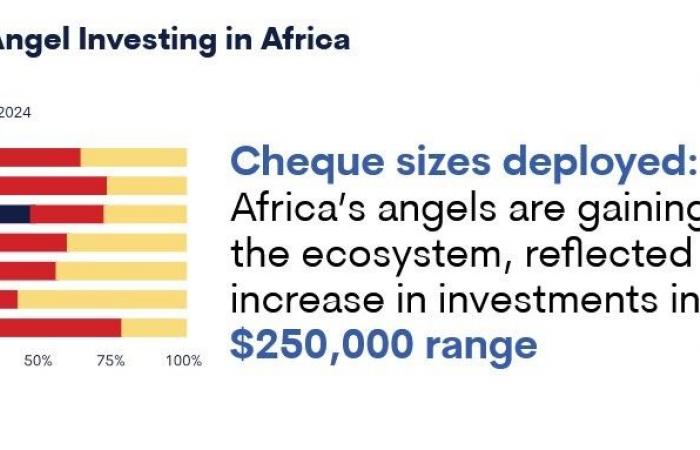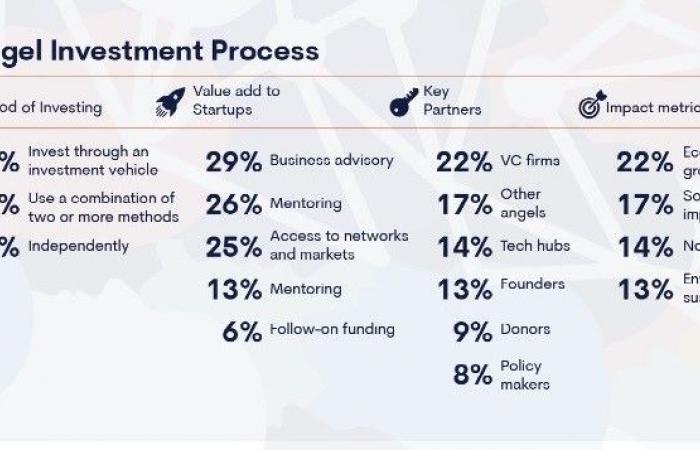(Ecofin Agency) – While they mainly intervene during the early stages of business development, most business angels active on the continent opt for prudent investment strategies and form partnerships with other players in the ecosystem. entrepreneurial like venture capital firms and technology hubs.
Around 64% of business angels operating in Africa make investments of less than $25,000 per transaction, according to a report published in December 2024 by the African Business Angel Network (ABAN) in collaboration with research firm Briter Bridges and the African Angel Academy.
Titled « ABAN Angel Investment Survey 2024 »the report is based on a survey carried out among 110 business angels from more than 30 countries, 38% of whom are women.
These individuals, who are often entrepreneurs, senior executives or investment professionals, exercise great caution when choosing to inject funds from their salaries or previous investment income into new businesses, particularly during periods of economic uncertainty. Between 2022 and 2024, the proportion of business angels who opted for an average ticket of less than $25,000 rose to 77%. Small tickets allow more diversified, more numerous and less risky investments, especially since the majority of these investors focus on fundraising in the pre-seed (seed capital) and seed (first round of financing) phases.
Along the same lines, African business angels adopt varied approaches, depending on their risk tolerance and investment objectives. Half of respondents opt for equity investments through Simple Agreements for Future Equity (SAFE), a tool typically used by risk-tolerant investors hoping for high long-term returns .
28% of business angels prefer debt instruments, such as bonds convertible into shares or loans. These options offer returns over shorter periods of time, which appeals to the most risk-averse investors who are looking to make profits more quickly without completely giving up on possible equity investments in companies offering good growth prospects. .
High value-added support for entrepreneurs
Regarding the type of companies most targeted, 43% of business angels prefer to invest in high-growth companies such as innovative start-ups founded by entrepreneurs aged 25 to 40. In addition, 50% of them report a strong preference for companies that already have customer portfolios or generate revenue, even if they have not yet reached profitability. On the other hand, significant proportions of business angels favor companies operating in urban areas (90%) and with a high representation of women as co-founders, managers, employees, partners or clients (79%).
The report also indicates that 46% of these investors prefer to invest through a structured vehicle such as a syndicate of business angels, which helps spread risks, share expertise and increase access to capital. transaction flow. 26% invest independently (individually) while 28% opt for flexible investment strategies combining both methods.
Business angels also form partnerships with other categories of investors and numerous players in the entrepreneurial ecosystem such as venture capital firms (22%), technology hubs (14%), entrepreneurs (13%). , international donors (9%) and governments (8%). They also adopt strategies likely to increase their chances of making successful investments, such as joining business angel networks (57%) or participating in training sessions provided by the African Angel Academy ( 47%).
-While they primarily intervene to fill the financing gap for seed-stage companies, whose untested and unproven models often make them less attractive to investors with a low appetite for risk, business angels generally provide well more than funds to entrepreneurs. 93% of respondents provide at least one form of high-value support to entrepreneurs, including business consulting (29%), mentoring (26%), help accessing networks (25%) and improving governance (13%). 6% of business angels make follow-on investments in companies that are already in their portfolios based on solid growth, confidence in the management team or positive market trends. walk.

Walid Kefi
Edited by MF Vahid Codjia
Also read:
11/11/2022 – In Africa, more than 50% of business angels prefer to invest in start-ups that are already generating income (report)
09/28/2020 – AfDB joins the Board of Directors of the Global Business Angels Investment Forum
10/07/2020 – The Nest French-speaking Africa: how Reckya Madougou mobilizes business angels around local start-ups
03/11/2024 – In Africa, start-ups led by women received only 1.5% of funds raised between 2019 and 2023 (report)
05/10/2024 – Five start-ups honored for the 3rd Demo Day Challenge+ Africa at HEC Paris








